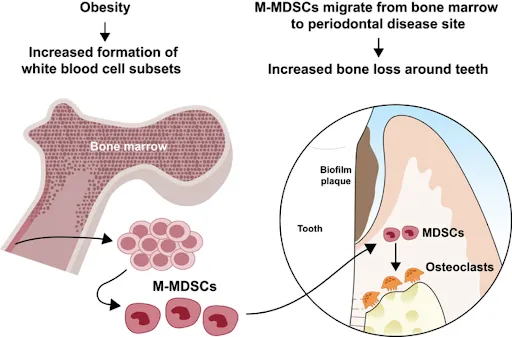
Obesity causes periodontal disease due to higher bone loss – a study finds
Sep 25, 2024Summary: Studies show that obesity is associated with weaker bones and increased tooth loss. They have found many ways in which high-calorie consumption may cause tooth loss. For example, a high-calorie diet may alter the activity of specific pathogens causing gum disease and tooth loss. However, researchers identified another mechanism causing tooth loss in a new study. They found that obesity could promote the production of immune cells, causing increased inflammation, which ultimately leads to periodontal disease and thus increased tooth loss.
Early researchers thought that bones' weakening in obesity is mainly due to mechanical damage. However, now they realize that it has more to do with higher inflammation caused by fatty tissues.
Fat cells are pretty active and produce numerous hormones, and changes in these hormones cause inflammation and bone loss. This bone loss may cause periodontal disease and even increased tooth loss.
Human bones are metabolically very active. They are constantly remodeled. Two bone cells play a vital role in bone remodeling: osteoclasts and osteoblasts. Osteoclasts reabsorb the bones, literally eat out the damaged parts of the bones, and osteoblasts then carry out all the repairs and bone reformation.
Any miscommunication between these two cells due to metabolic changes or hormonal changes may damage bone health. Unfortunately, this is precisely what happens in obesity. Inflammation caused by adipose tissues alters the communication between osteoclasts and osteoblasts, with osteoclasts becoming more acting and thus causing greater bone loss1.
Studies show that obesity is associated with more significant tooth loss in various population groups. This is especially visible in young adults, though there is not much difference in older adults. It is because, in older adults, there are multiple reasons for tooth loss. These results were confirmed in a Swedish population study of 2816 randomly selected men and women aged 30 to 74 years2.
Needless to say that there are many ways in which obesity affects bone and tooth health. Severe obesity is not a normal physiological state. It means high inflammation and hormonal changes. It also means altered metabolism. For example, one study found that altered fatty acids in the blood also play a role in tooth loss. It appears that changes in the fatty acid content of blood may activate specific pathogens/bacteria known to cause tooth decay3.

The new study further sheds light on various ways in which obesity may weaken jawbones and thus increase tooth loss.
This new study found that obesity increases the formation of certain types of white blood cells in the bone, and thus causing altered immune and inflammatory responses. One such change is increased production of myeloid-derived suppressor cells (MDSC)3,4.
MDSC cells are generally good as they help fight diseases. However, obesity means that their level may be chronically elevated, causing unnecessary alarm and harm. These MDSC cells migrate to the periodontal region or jawbones, and they stimulate the activity of osteoclasts, resulting in more significant bone reabsorption.
Thus, an increase in the activity of osteoclasts in the periodontal region and relatively suppressed activity of osteoblasts means that over time, periodontal regions, or gums become inflamed, and bones holding teeth at their place weaken, which ultimately results in greater tooth loss.
These new findings shed light on many things. First, it essentially confirms the complex way obesity affects health and various body functions. It also shows that obesity is not normal and rather a pathology. Although it may not seem to damage health in the short run, it causes considerable changes in the body over the long run, affecting almost every body function.
References
- Muluke M, Gold T, Kiefhaber K, et al. Diet-Induced Obesity and Its Differential Impact on Periodontal Bone Loss. J Dent Res. 2016;95(2):223-229. doi:10.1177/0022034515609882
- Östberg AL, Nyholm M, Gullberg B, Råstam L, Lindblad U. Tooth loss and obesity in a defined Swedish population. Scand J Public Health. 2009;37(4):427-433. doi:10.1177/1403494808099964
- Kwack KH, Zhang L, Sohn J, Maglaras V, Thiyagarajan R, Kirkwood KL. Novel Preosteoclast Populations in Obesity-Associated Periodontal Disease. J Dent Res. Published online October 12, 2021:220345211040729. doi:10.1177/00220345211040729
- Halade GV, El Jamali A, Williams PJ, Fajardo RJ, Fernandes G. Obesity-mediated inflammatory microenvironment stimulates osteoclastogenesis and bone loss in mice. Experimental Gerontology. 2011;46(1):43-52. doi:10.1016/j.exger.2010.09.014
Don't miss a beat!
New moves, motivation, and classes delivered to your inbox.
We hate SPAM. We will never sell your information, for any reason.

